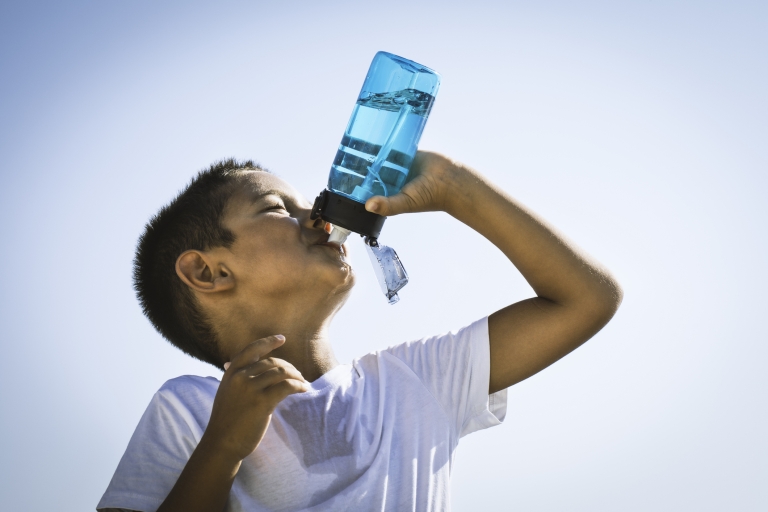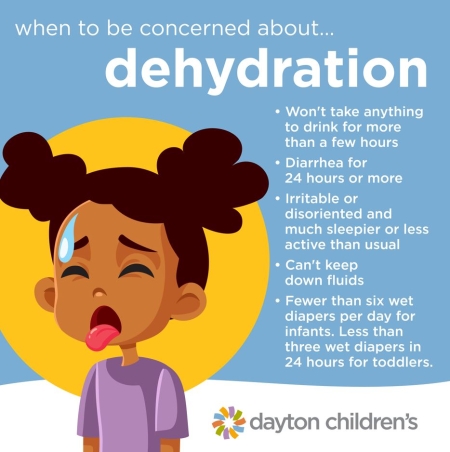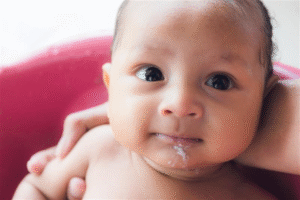when to be concerned about dehydration

in this article:
- What is dehydration?
- What are the signs of dehydration?
- When to be concerned about dehydration?
- How can dehydration be prevented?
Dehydration is a common but often overlooked condition that can have serious consequences. Whether you’re an athlete pushing your limits, a busy student juggling multiple tasks or simply enjoying a hot summer day, staying hydrated is crucial. But how do you know when your body is crying out for more water? Recognizing the signs of dehydration early can prevent a range of issues, from mild discomfort to severe health risks. We met with Lora Scott, MD, chief of sports medicine at Dayton Children’s Hospital to learn more about the condition, symptoms and when to be concerned about dehydration.
what is dehydration?
Dehydration is when the body does not have enough water. This can occur anytime you lose more water than you drink. A child can lose more fluids than usual from vomiting, diarrhea, or increased sweat (heat, exercise, fever). Other times, there is no increase in fluid loss, but a child does not drink enough water because of issues like a demanding schedule or lack of access.
what are the signs of dehydration?
The signs of dehydration can include:
- A dry or sticky mouth
- Few or no tears when crying
- Eyes that look sunken
- Urinating less frequently
- Crankiness
- Fatigue
- Dizziness when standing
You can check hydration by looking at your urine color. Urine should be pale yellow to colorless. Darker colors indicate dehydration.
when to be concerned about dehydration?
A parent or caregiver should be concerned about dehydration if their child:
- Won’t take anything to drink for more than a few hours
- Diarrhea for 24 hours or more
- Irritable or disoriented and much sleepier or less active than usual
- Can’t keep down fluids
- Fewer than six wet diapers per day for infants. Less than three wet diapers in 24 hours for toddlers.

how can dehydration be prevented?
To prevent dehydration, the recommendations will change based on the age of your child. For:
Infants: Whether you breastfeed or formula feed, it is important to remember that your baby’s feeding needs are unique. If you choose to bottle feed, on average, your baby should take in about 2½ ounces of expressed breastmilk or infant formula per day for every pound of body weight. This is about 24-32 oz/day. But they will likely regulate their intake from day-to-day to meet their own specific needs, so let them tell you when they’ve had enough.
Around 6 months, you can start offering your baby a little bit of water (4-8 oz/day) in an open, sippy, or strawed cup. Whole milk is not recommended before 12 months of age.
Toddler: A toddler should drink no more than 16 oz/day of milk and try to drink 8-32 oz of water each day.
School-aged children and adolescents can drink water throughout the day and during activities. In addition, school-aged children can:
- Start replacing salt lost through sweat around 30-60 minutes into exercise. (The exact time varies with temperature, humidity, conditioning level, and genetics).
- Drink sports drinks which replace salt losses including drinks like Pedialyte, Gatorade, Powerade and Body Armor. They are easy to drink while on-the-go during exercise.
- Avoid caffeinated beverages, energy drinks and sodas before, during, and after training.
- After the exercise activity, have a sports drink and snack as you replace additional salt through food.
If you believe your child is severely dehydrated, you should visit the nearest emergency department to get fluids replaced as quickly as possible.
symptom checker
Check symptoms and dosage charts and get quick advice on what to do when your kids are sick.
here when you need us
Whether you’re looking for the right provider, ready to make an appointment, or need care right now—we’re here to help you take the next step with confidence.




